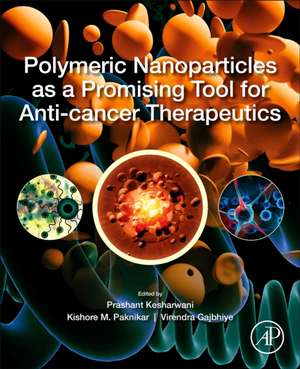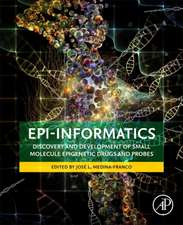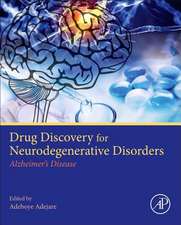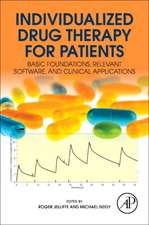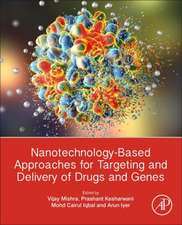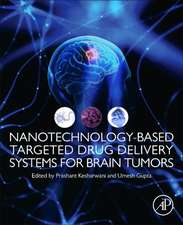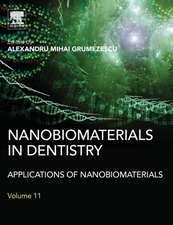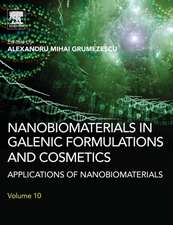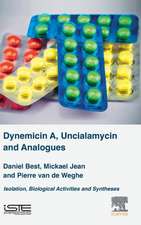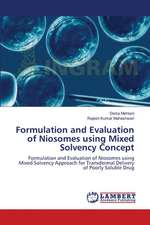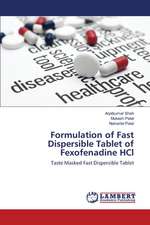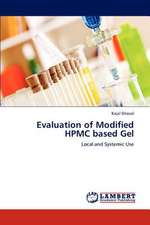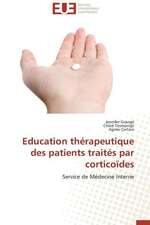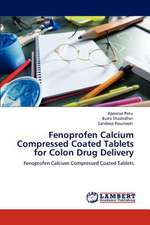Polymeric Nanoparticles as a Promising Tool for Anti-cancer Therapeutics
Editat de Prashant Kesharwani, Kishore M. Paknikar, Virendra Gajbhiyeen Limba Engleză Paperback – 26 iun 2019
Users will find this to be an ideal reference for research scientists and those in the pharmaceutical and medical fields who are working to develop novel cancer therapies using nanoparticle-based delivery systems.
- Explores the development of polymeric nanoparticle systems for the purpose of cancer therapy
- Presents thoroughly analyzed data and results regarding the usage of polymeric nanoparticles-based platforms for the diagnosis and treatment of cancer
- Highlights various cancer characteristics that can be targeted for therapeutic development using polymeric nanoparticles
Preț: 824.32 lei
Preț vechi: 1104.22 lei
-25% Nou
Puncte Express: 1236
Preț estimativ în valută:
157.78€ • 171.45$ • 132.62£
157.78€ • 171.45$ • 132.62£
Carte tipărită la comandă
Livrare economică 14-28 aprilie
Preluare comenzi: 021 569.72.76
Specificații
ISBN-13: 9780128169636
ISBN-10: 012816963X
Pagini: 432
Dimensiuni: 191 x 235 x 28 mm
Greutate: 0.74 kg
Editura: ELSEVIER SCIENCE
ISBN-10: 012816963X
Pagini: 432
Dimensiuni: 191 x 235 x 28 mm
Greutate: 0.74 kg
Editura: ELSEVIER SCIENCE
Public țintă
Research scientists and industry professionals in pharmaceutical science, biomedicine, polymer science, nanomedicine, cancer research and biotechnology who are working on technological advancement in designing targeted therapies and drug delivery systemsCuprins
1. Current status and future challenges of various polymers as cancer therapeutics2. An overview of polymeric nanoparticles as potential cancer therapeutics3. Poly acrylate (e.g., poly methylacrylate, poly ethyl acrylate, etc.) nanoparticles as promising tool for anticancer therapeutics4. Poly (alkyl cyano acrylate) nanoparticles as promising tool for anticancer therapeutics5. Poly (α-hydroxy acids) based nanoparticles for Drug/Gene delivery for cancer therapy6. Poly (ester), Poly hydroxy alkanoate nanoparticles as promising tool for anticancer therapeutics7. Poly (phospho ester), Poly (phosphazene) nanoparticles as promising tool for anticancer therapeutics8. Poly (carbonate) nanoparticles as promising tool for anticancer therapeutics9. Poly (amino acid) nanoparticles as promising tool for anticancer therapeutics10. Poly ethylene glycol nanoparticles as promising tool for anticancer therapeutics11. Dendrimer (polyamidoamine, polypropylene imine, poly-L-lysine, carbosilane dendrimers, triazine dendrimers) as promising tool for anticancer therapeutics12. Conjugated polymer nanoparticles as promising tool for anticancer therapeutics13. Microbes based natural polymer (Xanthum gum, alginate, gellan gum, carrageenan) nanoparticles as promising tool for anticancer therapeutics14. Plant based natural polymer (Guar gum, pectin, starch, cellulose, cyclodextrins) nanoparticles as promising tool for anticancer therapeutics15. Animal based natural polymer (Gelatin, chitosan, albumin, hyaluronic acid, chondroitin sulphate) nanoparticles as promising tool for anticancer therapeutics16. Polymersomes as promising tool for anticancer therapeutics17. Other polymers (Poly sulfonic acids, Poly carboxylic acids, Poly boronic acid, Poly silamine, etc.) nanoparticles as promising tool for anticancer therapeutics18. Conclusion and future prospective of polymeric nanoparticles as cancer therapeutics
